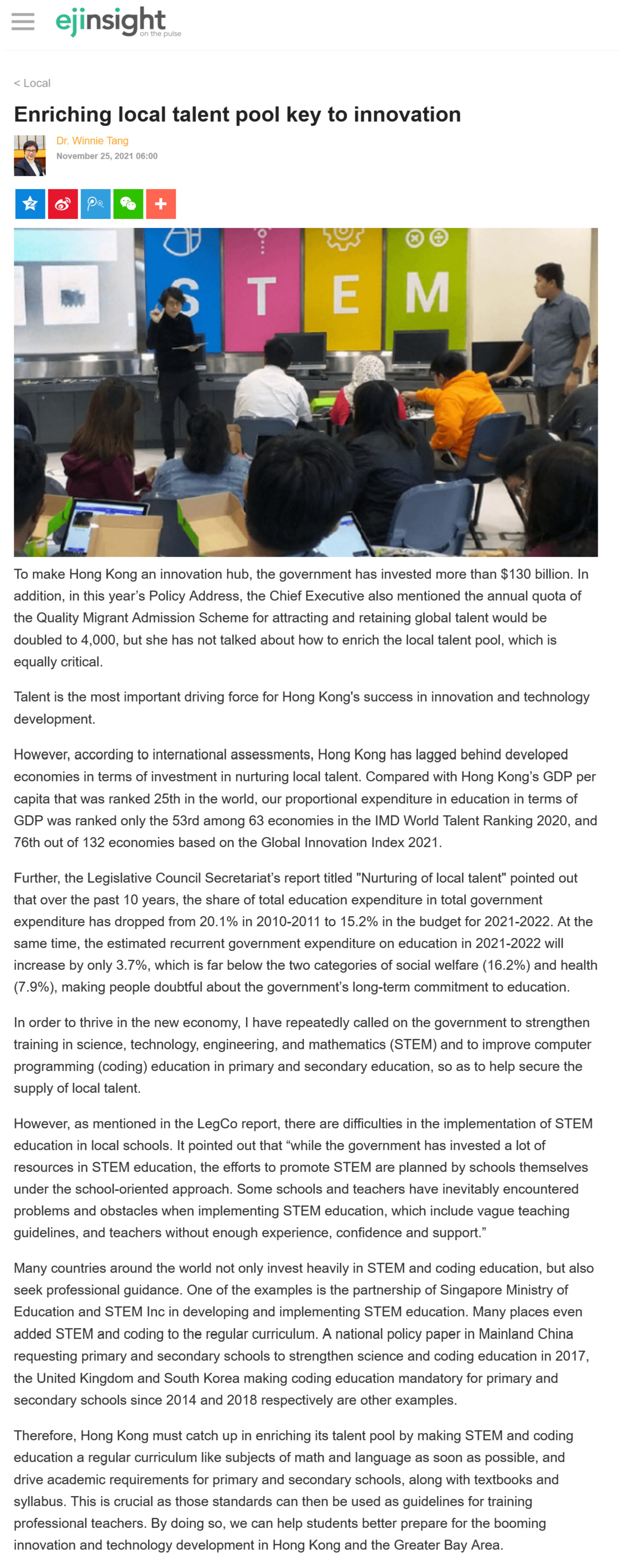網上版請按此

Enriching local talent pool key to innovation
To make Hong Kong an innovation hub, the government has invested more than $130 billion. In addition, in this year's Policy Address, the Chief Executive also mentioned the annual quota of the Quality Migrant Admission Scheme for attracting and retaining global talent would be doubled to 4,000, but she has not talked about how to enrich the local talent pool, which is equally critical.
Talent is the most important driving force for Hong Kong's success in innovation and technology development.
However, according to international assessments, Hong Kong has lagged behind developed economies in terms of investment in nurturing local talent. Compared with Hong Kong's GDP per capita that was ranked 25th in the world, our proportional expenditure in education in terms of GDP was ranked only the 53rd among 63 economies in the IMD World Talent Ranking 2020, and 76th out of 132 economies based on the Global Innovation Index 2021.
Further, the Legislative Council Secretariat's report titled "Nurturing of local talent" pointed out that over the past 10 years, the share of total education expenditure in total government expenditure has dropped from 20.1% in 2010-2011 to 15.2% in the budget for 2021-2022. At the same time, the estimated recurrent government expenditure on education in 2021-2022 will increase by only 3.7%, which is far below the two categories of social welfare (16.2%) and health (7.9%), making people doubtful about the government's long-term commitment to education.
In order to thrive in the new economy, I have repeatedly called on the government to strengthen training in science, technology, engineering, and mathematics (STEM) and to improve computer programming (coding) education in primary and secondary education, so as to help secure the supply of local talent.
However, as mentioned in the LegCo report, there are difficulties in the implementation of STEM education in local schools. It pointed out that "while the government has invested a lot of resources in STEM education, the efforts to promote STEM are planned by schools themselves under the school-oriented approach. Some schools and teachers have inevitably encountered problems and obstacles when implementing STEM education, which include vague teaching guidelines, and teachers without enough experience, confidence and support."
Many countries around the world not only invest heavily in STEM and coding education, but also seek professional guidance. One of the examples is the partnership of Singapore Ministry of Education and STEM Inc in developing and implementing STEM education. Many places even added STEM and coding to the regular curriculum. A national policy paper in Mainland China requesting primary and secondary schools to strengthen science and coding education in 2017, the United Kingdom and South Korea making coding education mandatory for primary and secondary schools since 2014 and 2018 respectively are other examples.
Therefore, Hong Kong must catch up in enriching its talent pool by making STEM and coding education a regular curriculum like subjects of math and language as soon as possible, and drive academic requirements for primary and secondary schools, along with textbooks and syllabus. This is crucial as those standards can then be used as guidelines for training professional teachers. By doing so, we can help students better prepare for the booming innovation and technology development in Hong Kong and the Greater Bay Area.
Dr. Winnie Tang
Adjunct Professor, Department of Computer Science, Faculty of Engineering; Department of Geography, Faculty of Social Sciences; and Faculty of Architecture, The University of Hong Kong